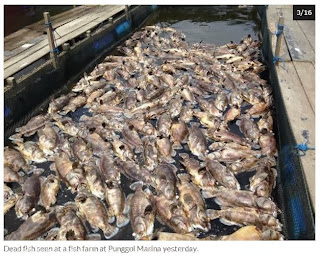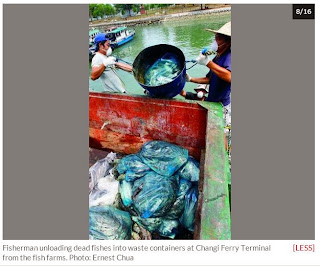Kenneth Tan Today Online 13 Feb 14;
SINGAPORE — Fish farmers yesterday continued to add up their losses as the mass fish deaths resulting from the low levels of dissolved oxygen in the water showed no sign of abating, while National Development Minister Khaw Boon Wan pledged that the Government would “do its utmost” to help farmers.
Farmers TODAY spoke to said they have each incurred losses ranging from S$15,000 to S$300,000 and, with uncertainty over how long the situation will last, they hope the authorities can help in the interim, as well as provide long-term support such as better monitoring of algae and plankton levels in the water.
Others are doing their best to mitigate losses by selling the remainder of their living fish as quickly as possible or moving them to less affected waters.
In a blog post yesterday, Mr Khaw said he had been told by Agri-Food and Veterinary Authority (AVA) Chief Executive Officer Tan Poh Hong that the situation was serious, with those rearing more susceptible species such as grouper, threadfin and golden trevally more badly affected, while some farms had lost their entire stock.
“We had immediately sent in more workers to deploy aeration systems to help normalise the water conditions and also to assist in the disposal of dead fish,” he said. “I have asked MND and AVA to continue to help our farmers and look into their requests to see how best we can help them in the current situation.”
On Tuesday, the AVA said about 160 tonnes of dead fish had been found in farms on both the East and West Johor Straits. This could have been caused by a plankton bloom — brought on by hot weather or the neap tide — which can drain seawater of oxygen.
A similar incident occurred in 2009, where more than 200,000 dead fish washed up along Pasir Ris beach, but Mr Gary Zhang, who has been a farmer for more than 33 years, said this year’s spell is the worst he has seen.
He said an algae bloom, which could also be triggered by the lack of rain, could be another factor behind the deaths. When algae die, the decay process deprives water of oxygen. He has moved the rest of his livestock to safer waters in Malaysia for the time being.
The AVA has been collecting fish carcasses from affected fish farms and has placed a skid tank at Changi Point Ferry Terminal, where farmers can dispose of dead fish.
Mr Joseph Wee, who owns Blue Marine Fish Farm, said he had also dried some of his dead fish to feed other marine livestock. About seven tonnes of his fish have died, costing him about S$300,000.
Mr Timothy Ng, President of Fish Farmers Association of Singapore, which has about 40 members, said the association hopes to have a dialogue with the authorities, adding that it did not have the resources to help farmers much.
The Government could help by designating new sites to set up fish farms, such as north of Pulau Tekong or in waters with less algae count, which can be used to house stock in the event of a crisis of this nature, Mr Zhang suggested. A team could also monitor the algae or plankton levels in the waters weekly and alert farmers when levels become critical so precautionary measures can be taken.
“If you are prepared, you can place your fish in a canvas bag, put a net underneath while filtering the algae from the water. You can move the fish to a safer place then,” Mr Zhang said. “In 2009, we were not so well prepared. This time, the moment our fish started dying on Saturday, we moved the rest of them by Sunday.”
ADDITIONAL REPORTING BY AMANDA LEE

Pasir Ris mass fish deaths could lead to over $1 million in losses for farmers
Nur Asyiqin Mohamad Salleh The Straits Times AsiaOne 13 Feb 14;
SINGAPORE - Pasir Ris has been hit by mass fish deaths, with farmers there estimating that fish dying by the thousands daily could lead to losses exceeding $1 million.
Several affected fish farmers said the deaths started one or two days before the first day of the Chinese New Year.
Yesterday, fish farm workers in the area were seen moving bags of dead fish by boat to the vicinity of Changi Point Ferry Terminal, where a container had been set up for dead fish.
Fish farmer Simon Ho, 64, said he has lost about 20,000 fish, including grouper and silver pomfret, and could lose almost $50,000. "A lot of us could go bankrupt because of this."
The Agri-Food & Veterinary Authority of Singapore (AVA) is looking into the mass fish deaths in over 20 farms near Pasir Ris, along the East Johor Strait.
It said causes could include low levels of dissolved oxygen or plankton bloom caused by the hot weather and neap tide, or when the high tide is at its lowest. Plankton blooms happen when micro-organisms in the seawater multiply quickly, draining the seawater of oxygen.
In 2010, a plankton bloom wiped out more than 200,000 fish around Pasir Ris.
Pasir Ris fish farmers are now trying to stem their losses by pumping oxygen and pouring medicine into the water to increase the immunity of the fish.
The AVA, which has collected samples from the farms for analysis, said it is helping farmers set up aeration systems to pump oxygen into the water.
But affected farmers want help in other areas to keep their business afloat. They said factors like cheap fish from Malaysia will make it hard for them to recover.
Fish farm owner Tang Kwai Leng, who is in her 50s, said she has lost over 3,000 fish. This includes red groupers, which can fetch $40 for 1kg. She said: "This is a black new year for us."
MND, AVA to help farmers who have lost their fish stocks: Khaw
Channel NewsAsia 12 Feb 14;
SINGAPORE: The Agri-Food and Veterinary Authority of Singapore (AVA) is working closely with local fish farmers to try and salvage the situation after their fish stocks were wiped out over the last week.
In a blog post (also on facebook), National Development Minister Khaw Boon Wan said many farms, especially those in the North Eastern shores off Changi and Pulau Ubin, are grappling with large numbers of dead fish.
Mr Khaw added that those farms rearing more susceptible species like grouper, threadfin and golden trevally are more badly affected.
Some farms have lost their entire stocks.
Mr Khaw said the ministry would do its utmost to help the farmers ride out this rough patch.
The ministry had immediately sent in more workers to deploy aeration systems to help normalise the water conditions and also to assist in the disposal of dead fish.
The ministry and AVA will continue to help the farmers and look into their requests to see how best to help them in the current situation.
The sudden mass deaths of fish are likely caused by neap tide -- where the difference between the high and low tide is least -- and hot weather.
- CNA/ms
Farmers losing S$15,000 to S$300,000 as mass fish deaths look set to continue
posted by
Ria Tan
at
2/13/2014 11:46:00 AM
![]()
labels aquaculture, extreme-nature, marine, pulau-ubin, shores, singapore








